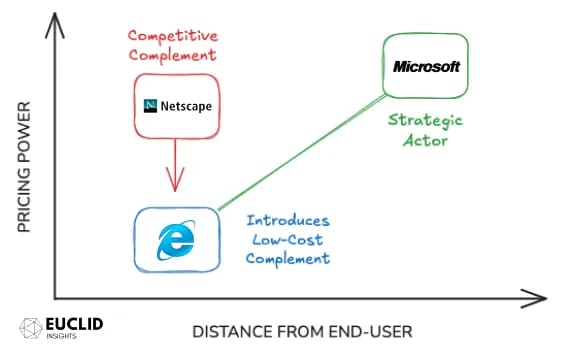- Tactical Tips by DECODE
- Posts
- 🚀 How to disrupt incumbents?
🚀 How to disrupt incumbents?
3 tactics, 2 traps and 1 tool to disrupt incumbents
Hello founders!
Welcome to ‘Tactical Tips’ by Jerel and Shuo at DECODE, where we cover one new idea to help you build and grow your startup – every week in <5 minutes!
Today, we’ll be answering the question: “How to disrupt incumbents?”
And here’s advice inspired by Nic Poulos, Founder & General Partner at Euclid Ventures, focused around commoditizing complements.
If you are trying to break into a market dominated by incumbents, today’s newsletter is for you.
Smart companies try to commoditize their products’ complements.
🔥 Inside this issue:
✅ 3 tactics to commoditize complements
✅ 2 traps to avoid
✅ 1 tool to leverage
👇Let’s dive in.
Grab 30 mins with Jerel—Need personalized advice on building your startup or just want to talk? Happy to help and make intros if it’s the right fit.
💌Someone shared this with you? Subscribe here.
3 tactics to commoditize complements
🎯 Reduce pricing power
Identify critical layers (e.g., hardware, OS, browser, device) customers need alongside the core product that competitors monetize but the product depends on (e.g. Netscape’s browser depended on server sales)
Launch or acquire a competing product in that layer, and open-source, give away, or drastically underprice it (e.g. Microsoft gave Internet Explorer browser away for free)
Integrate the free or low-cost complement with the core offering to boost adoption, create lock-in, and establish industry standards through bundling or open licensing (e.g. Google open-sourced Android and bundled with search to protect its ad business)

📋 Lower switching costs
Open-source key technologies to enable easy migration between providers (e.g. Google open-sourced Kubernetes, pressuring AWS to adopt it and weakening lock-in)
Build industry-wide partnerships to drive adoption of common standards (e.g. Google collaborated with Microsoft, RedHat, IBM, and Docker to push Kubernetes adoption)
Create frameworks that simplify integration and reduce vendor dependence (e.g. Anthropic’s Model Context Protocol (MCP) standardizes AI data sharing, easing switching between AI models)
🗓️ Simplify onboarding
Reduce end-user burden of procurement and implementation of the complement (e.g. building in-house and bundling)
Shift costs from CapEx to OpEx to ease budget constraints and reduce friction (e.g. move from upfront purchases to pay-as-you-go models)
Offer group incentives by aggregating demand and pooling resources more efficiently
2 traps to avoid
🚨Commoditizing a complement that locks in the core product
Making a complement easier to switch can backfire if it weakens the core product’s lock-in
Commoditize only if the complement isn’t key to customer loyalty
🚨Failing to capture value after disrupting the ecosystem
Complement commoditization opens the door for others to win
Ensure the core product is well-positioned to capture the value shift fast or lose it
1 tool to leverage
📖 Best practice on disrupting incumbents
Nearly every incumbent with a system of record is adding LLM features to commoditize and block startup threats
LLM wrappers aren’t enough—combine them with proprietary data or high value workflows and innovate across multiple layers of the customer value chain
Bonus: 1 trend to spark startup ideas
📈 Avatars are becoming a foundational interface layer with commercial promise
Avatars are already core to product experiences at Mercor and Delphi, with surging demand fueling HeyGen ($35M+ ARR) and Synthesia ($100M+ ARR)
Three drivers behind the boom:
AI enables avatars to hold context-rich, coherent conversations that boost trust and utility
Recent breakthroughs in real-time audio and video generation are making avatars lifelike and emotionally expressive
Coaches, clinics, influencers, and sales teams are using avatars to operate 24/7
Opportunities include:
High-fidelity expressions across cultures and tones
Easy customization and training
IP rights, especially for public figures
Avatar-to-avatar delegation and collaboration
Cross-platform integration and analytics for effectiveness
Startup Knowledge CheckMain reason to run a sales pilot? |
Hint: Read our past newsletter around adding sales pilot.
Continue learning
Other resources
Apply to participate in Founders Pop-up Board Advisory and receive startup feedback from execs at Microsoft, Google, Meta, Reddit (Free)
Schedule for a consultation on structuring your equity-based compensation plan (Free).
Fill this form and we’ll get in touch for details on how we can get your brand in front of our community.
Still figuring out your startup idea?Take our free course ― Zero to Startup: How to Identify a Winning Idea Fast, where you’ll receive 1 email per day over 5 days to help you get started! |
What did you think of today's content?Your feedback helps us improve. |
Please complete this 2-min survey to help us get to know you and better tailor content for you.
“Reply” with any follow-up questions you might have, and we’ll work on covering them in a future newsletter!
Stay tuned for more startup wisdom in next week’s edition!